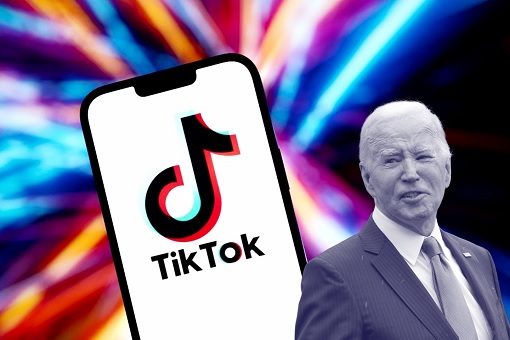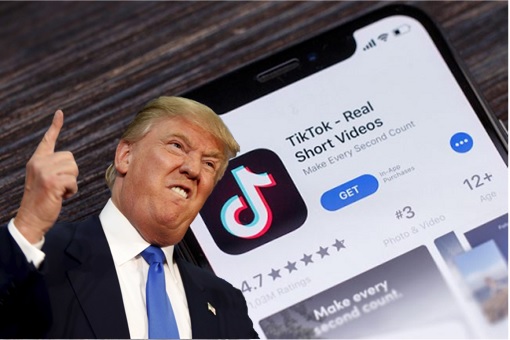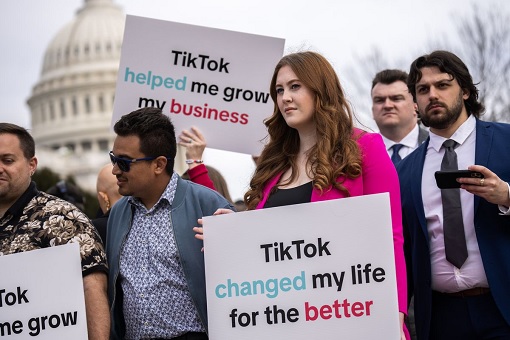
Scrambling To Save TikTok – Why And How Trump Flip-Flops After Accusing TikTok Of National Security Threat
January 17th, 2025 by financetwitter
In a hilarious and stunning twist, the man who had tried to ban TikTok during his first term as the U.S. president is now defending and saving the Chinese social media platform from being shut down. Donald Trump is now scrambling to protect the short-form video app as Biden says it won’t enforce a ban that is set to take effect before he leaves the White House on Monday (Jan 20, 2025).
Biden’s decision means the fate of TikTok now depends entirely on President-elect Trump. Last year, the Congress passed a law, which Biden signed, that required TikTok’s Chinese parent – ByteDance – to sell TikTok within 270 days. Failure to divest the company by January 19, a day before the presidential inauguration, would see the app prohibited from U.S. app stores.
Under the legislation, however, Biden could extend the deadline another 90 days in the event the company made progress toward a sale, giving TikTok up to a year before facing a ban. TikTok retaliated, threatening legal action whilst condemning the law “unconstitutional” and said it “would devastate” the platform’s 170 million American users and 7 million businesses that operate on the app.

While U.S. Supreme Court is currently deciding whether to uphold the law and allow TikTok to be banned on Sunday, Trump’s incoming national security adviser Mike Waltz said the new Republican administration will keep the social media app alive in the U.S. if there is a viable deal. In a positive sign, TikTok CEO – Shou Zi Chew – not only will attend Trump’s inauguration, but will also be seated among other high-profile invitees.
Interestingly, even top Senate Democrat Chuck Schumer, who was a strong supporter of the law to force a sale, has suddenly urged President Joe Biden to extend by 90 days the deadline shutdown – suggesting a growing concern among prominent Democrats about the potential impact and political fallout of shutting down TikTok, which had helped Trump tremendously in winning the 2024 presidential election.
Trump had leveraged on TikTok as a lethal weapon for Americans to vote against Democrat Vice President Kamala Harris. And he could continue to use TikTok to promote his own administration while at the same time attack his political enemies during his next four years in office. Likewise, now that the Democrats had lost, Biden has no incentive to ban TikTok.

TikTok, besides a political tool to attack his enemies, is also an excellent subject in foreign affairs as Trump has started to engage with Chinese President Xi Jinping to tame China and to exert his influence. Trump has extended an invitation to Xi to his inauguration, which the Chinese leader will not attend but is sending his vice-president, Han Zheng, as his special representative.
Beijing’s decision is seen as “giving face” to Trump, as well as a positive diplomatic signal, as such event is typically attended by foreign ambassadors and diplomats. Had Trump insisted on banning TikTok, he will not likely get the bragging rights that President Xi has sent his special representative as a sign of respect to him, even though Beijing was merely hedging its bet.
Even if Biden decides to bulldoze the ban on TikTok before Trump takes over, the new incoming president could still sign an executive order to allow the Chinese app to continue operating. Essentially, both Biden and Trump’s U-turn not to ban TikTok as they had fiercely declared previously means TikTok isn’t a national security threat after all, but merely part of the anti-China political drama.

To save TikTok, Trump could issue an executive order, invoking the sweeping International Emergency Economic Powers Act, and claim that keeping TikTok is beneficial for national security (contrary to previous claim of a national security threat). The prospect of a TikTok ban has already triggered tonnes of American users to seek alternatives, with Chinese social media app RedNote gaining nearly 3 million U.S. users in one day earlier this week.
Therefore, President Trump could argue and justify that his executive order would keep American users from fleeing to Chinese app RedNote, which is run directly from China and subject to Communist Party censorship. The order could inform tech companies like Apple or Google that they would face no consequences for flouting the law, for example by keeping TikTok in their app stores past the legally mandated deadline.
The flip-flopping is breathtaking as Trump has been talking big about controlling China and banning TikTok, only to repeatedly express his desire to save TikTok – even inviting TikTok’s CEO to sit beside him at his inauguration despite TikTok being linked to China’s Communist Party. When Donald Trump ordered the U.S. government to ban TikTok in 2020, he said the “aggressive action” was necessary “to protect our national security.”

But there’s another hidden reason why Trump is saving TikTok. He could score a huge win if the Chinese app agrees to be sold to Elon Musk, who is a “good friend” of China and at the same time – the most trusted lieutenant of Donald Trump. For Musk, acquiring TikTok and preserving Americans’ access to the app would give him control over an even larger and more influential social media platform than X (formerly Twitter).
As tech giants like Facebook and YouTube compete directly with TikTok for years, tensions have been growing between them. During the pandemic, thanks to Coronavirus lockdown, TikTok amassed over 2-billion downloads on Google Play Store and Apple’s App Store, largely because people “trapped” at home wanted to keep themselves entertained.
It was only 5 months earlier that TikTok surpassed 1.5-billion downloads. It means on average, there were 100-million downloads every month leading to the 2-billion milestone. It became the first app after WhatsApp, Instagram and Messenger break past the 2-billion downloads since 2014. As TikTok’s popularity skyrockets, so does its revenue – and of course, problems.

Users spent a whopping US$456.7 million on TikTok when it hit a 2-billion downloads in April, 2020, up from US$175 million just 5 months earlier (when it hit 1.5-billion downloads). It was a goldmine. The owner of TikTok made a net profit of US$3 billion in 2019 alone. But there’s one problem. TikTok is not owned by an American company, but a Chinese company – ByteDance.
Founded in 2012 by entrepreneur Zhang Yiming, ByteDance reportedly had a private valuation of between US$105 billion and US$110 billion, which would make it the most valuable start-up in the world. One Bloomberg analyst even speculated that it could be worth up to US$180 billion in an IPO (initial public offering). But it’s not easy to sell TikTok.
In a dramatic move to level the playing field with the U.S., Beijing had made some modifications to its export rules in 2020. Specially designed to prevent the previous forced sale of TikTok to Microsoft- Walmart, Oracle or any other U.S. companies, the new rules say that a license or approval from Beijing is needed before companies can export their technologies.

But even if Elon Musk is given “full access” to TikTok’s source code to ensure no back doors exist, it’s also true that Chinese officials have indicated Beijing is willing to approve a deal as long as ByteDance doesn’t have to give up the artificial intelligence algorithms behind the hugely successful Chinese app. The burning question is whether Musk is willing to buy TikTok without the secret sauce?
No comments:
Post a Comment